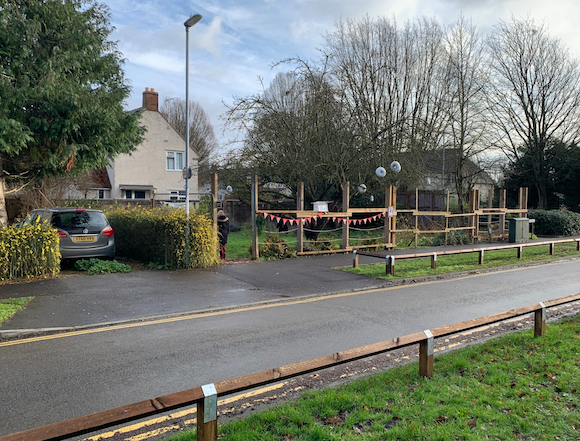Saturday mornings nearly always implied a short walk to the local bakery to buy fresh bread. Inevitably that was not all, as the round granary loaf got supplemented by herb-encrusted ham and slices of cheese with bits in it. But the real addition came a bit later, on the way home. A grand lady kept bees and made honey for sale from her own urban larder. I regularly bought viscous dollops from her garden, being careful to bring back my empty jars. The honey sweetened the weekend, as did our conversations. And I always looked forward to her waving me over. Quite suddenly, I moved away for a year or so and on return, following the relaunch of my bread-expeditions, I realised she had gone.
Eventually her house went as well. And then it was boarded up by battleship grey fences. But through the gaps I could still see that much of her garden remained: the pond, the holly tree and the clematis were there. Alas the hens and bees were gone. The council then announced a housing development plan, which at a time of shortage in social housing made a lot of sense. It still does. And I waited for the day the bulldozers would come. Progress always knocks down what we no longer value in monetary terms.
Some weeks later, some graffiti stopped me dead: “I miss the honey lady.” It turned out that I was not alone in this friendship. And actually, how silly of me not to think of the broader role she might have been playing. A child’s hand had also drawn a heart shape. Then a mural appeared and then a poem. And so I dug around. This woman, a lady called Joy, had not only sold me the odd jar of honey but had been at the centre of an informal web of relations for the local community. She was known to children and parents going to the local primary school and also provided a place for local residents to chat on their way to tend their allotments. She was clearly loved.
The local community wanted to build a legacy, so asked the council to hold off development for a few years to allow them to look after the site as a shared garden. It took a few years of lobbying, but last Autumn approval was given. And so thanks to some furiously supportive volunteering, a “meanwhile” community garden was provided as a public space just in time for Covid-19. The garden has offered a place of refuge throughout lockdown, with families small and large, old and young often seen on one of the two benches and running in and out of the overgrown grass and poppies. It is probably no more than 50 square metres but my how valuable it has been these past 18 weeks. It is both the community’s lungs and its shelter. And a sanctuary of peace. For those anxious and suffocated, it has offered a regular escape.
Understanding social value
How should we value public goods like this garden? In a recession the measured value of our goods and services produced falls. And this is the sharpest and deepest recession for at least a century. We are accustomed to an increase in our national prosperity of some 2 per cent per year and so a doubling every generation or so. So we know that something worrying is happening. But the index of measured activity barely captures or tracks how badly any individual region, sector or household may have done. It neither tracks very well the public amenities nor the resilience of our local communities, which may be fragile and at the point of breaking, or robust and able to nurture us when we need help the most. We need to understand better both the value of these provisions and why they can be produced in some places and not others. And what they say about economic and social problems, which is not a simple income maximisation issue, even though that is still my starting point for most analyses.
In the coming together, almost spontaneously, of many different groups of people, they created a synthetic nurturing honeycomb. The realignment of our economy from mass consumption and resource abuse will require a careful rethink of the role of the state, producing public goods, and the boundary with firms producing goods for consumption. The more we value public goods, the more the state will have to do to co-ordinate our plans and the more we will have to ask the owners of firms to pay for these with taxes. Remember them? But please, no tax on honey.













